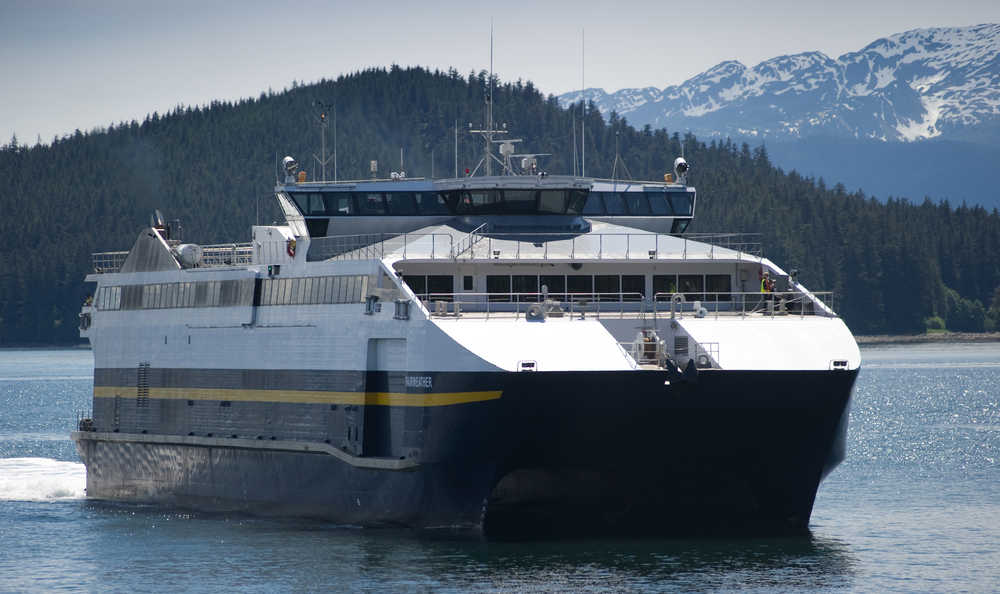Alaska Marine Highway System leaders are asking whether the system should increase rates, reduce its fleet or cut a port of call.
The questions were posed to about three dozen Ketchikan residents during a town hall on Wednesday in the chambers of the Ketchikan Gateway Borough Assembly.
Ketchikan’s event was one of six organized ahead of the January legislative session in Juneau.
Clear answers didn’t develop from the public at the meeting attended by Department of Transportation Commissioner Marc Luiken, Michael Neussl, DOT’s deputy director overseeing the ferry system, and John Falvey, the system’s general manager.
“It’s Prince Rupert or Bellingham,” Neussl said of the ports that could be cut from the system.
The Bellingham, Washington, run generates 25 percent of the system’s revenue, as officials repeated on Tuesday. Meanwhile, several factors stacked up against the Prince Rupert, British Columbia, run at the meeting.
A dispute between the U.S. and Canada mandating the use of American steel on the federally-funded project continues to be a problem for the system and has brought renovation of the aging dock to a halt.
Neussl, the main presenter at the town hall, said there’s an “element of risk” of a failure in the decades-old wooden dock in Prince Rupert that would close the terminal, through which traffic continues to decline.
Commenters were split on the ports at the meeting. One speaker said he prefers the Bellingham run because a 30-year-old DWI conviction requires him to “pay an extortion fee” of a couple of hundred dollars to the Canadian government should he enter the country.
However, another said he wants the Prince Rupert run because it gives easier access to the interior of the United States.
The two day boats under construction at the Ketchikan Shipyard would put the ferry system fleet at 15 vessels when they’re finished in 2018.
“I seriously don’t think that’s going to happen,” Neussl said of expanding the fleet, noting the day boats are intended to “initially” displace the combination of a fast ferry, LeConte and sometimes the Malaspina in northern Lynn Canal.
Instead, the budget crisis “may force our hand into downsizing the fleet before those vessels come online,” Neussl said.
The likely candidates would be the Taku, which will sit unused in Ketchikan throughout next summer, and the Malaspina, which still has its original engines. The latter boat is due for an engine replacement that will take more than a calendar year, according to Neussl.
A common thread among Ketchikan residents who spoke on Tuesday was resentment for what they see as an unfair focus for cuts on the ferry system.
Richard Harney was the first to ask about revenue and traffic rates of roads and airports in mainland Alaska, while Terri Robbins said the “elephant in the room” was the way lawmakers are budgeting.
“You’re talking a lot about changes that the Alaska Marine Highway System can make to deal with a smaller budget,” Robbins said. “No one’s talking about … what do we do to make our budget place the ferry system at a higher priority?”
Both Neussl and Luiken said they want to avoid pitting the ferry system against infrastructure to the north by gauging how much revenue the road system generates or what it costs to maintain.
“We’re really trying to stay out of the business of making those comparisons,” Luiken said.
But DOT is working to update a report from the early 2000s that quantified the financial effect of the ferry system on the state, Neussl said.
The report would go beyond payroll and spending in local communities to touch on how commercial traffic affects the state, the value of those businesses to their communities and the amount of money from the travelers that is brought into Alaska, according to Neussl.
At $1.3 million, commercial shipping revenue is a small part of the system’s budget, but the dollar amount “doesn’t factor in at all the economic impact to the community trying to ship that product out of that fish processing plant that makes the economic engine of that town go,” Neussl said.
DOT hopes to have updated information before the start of the January legislative session.

